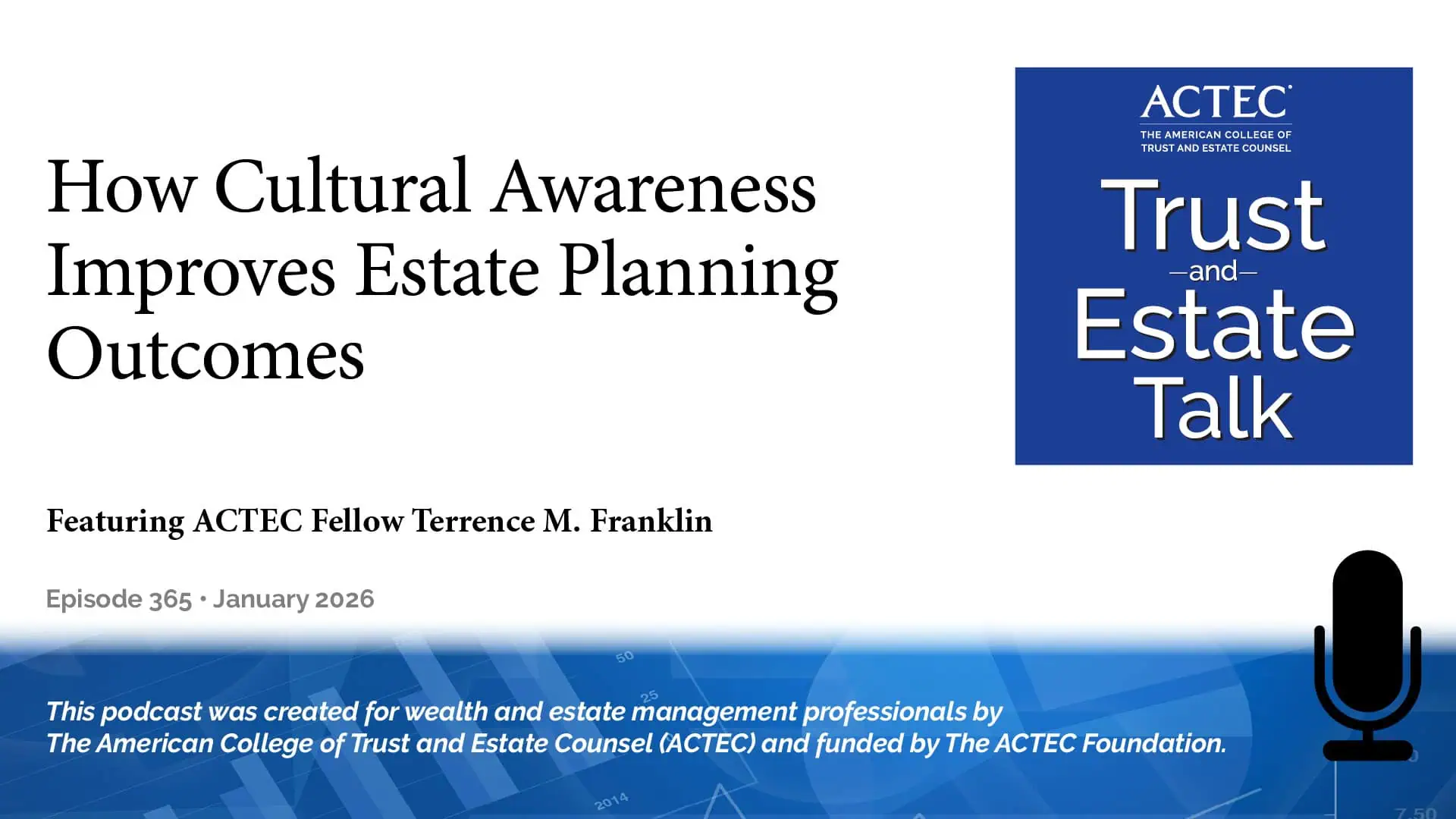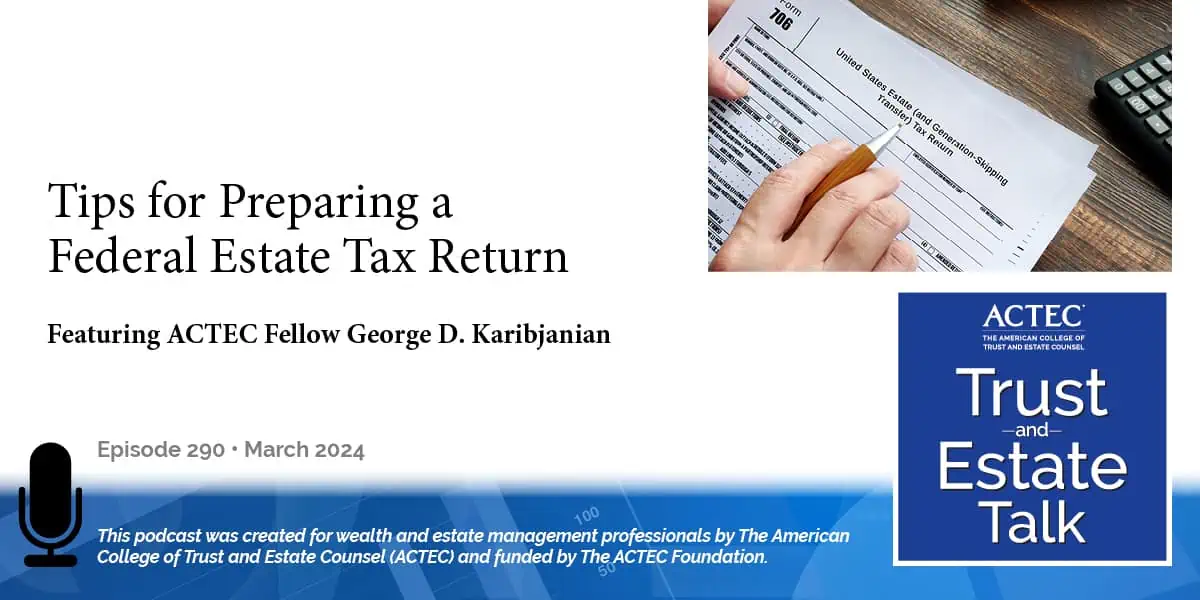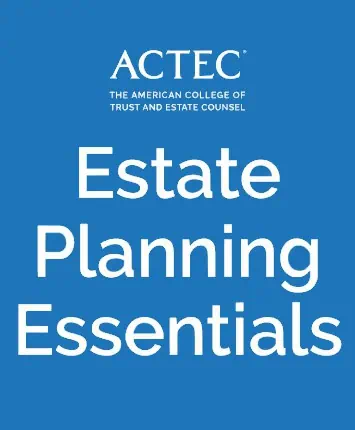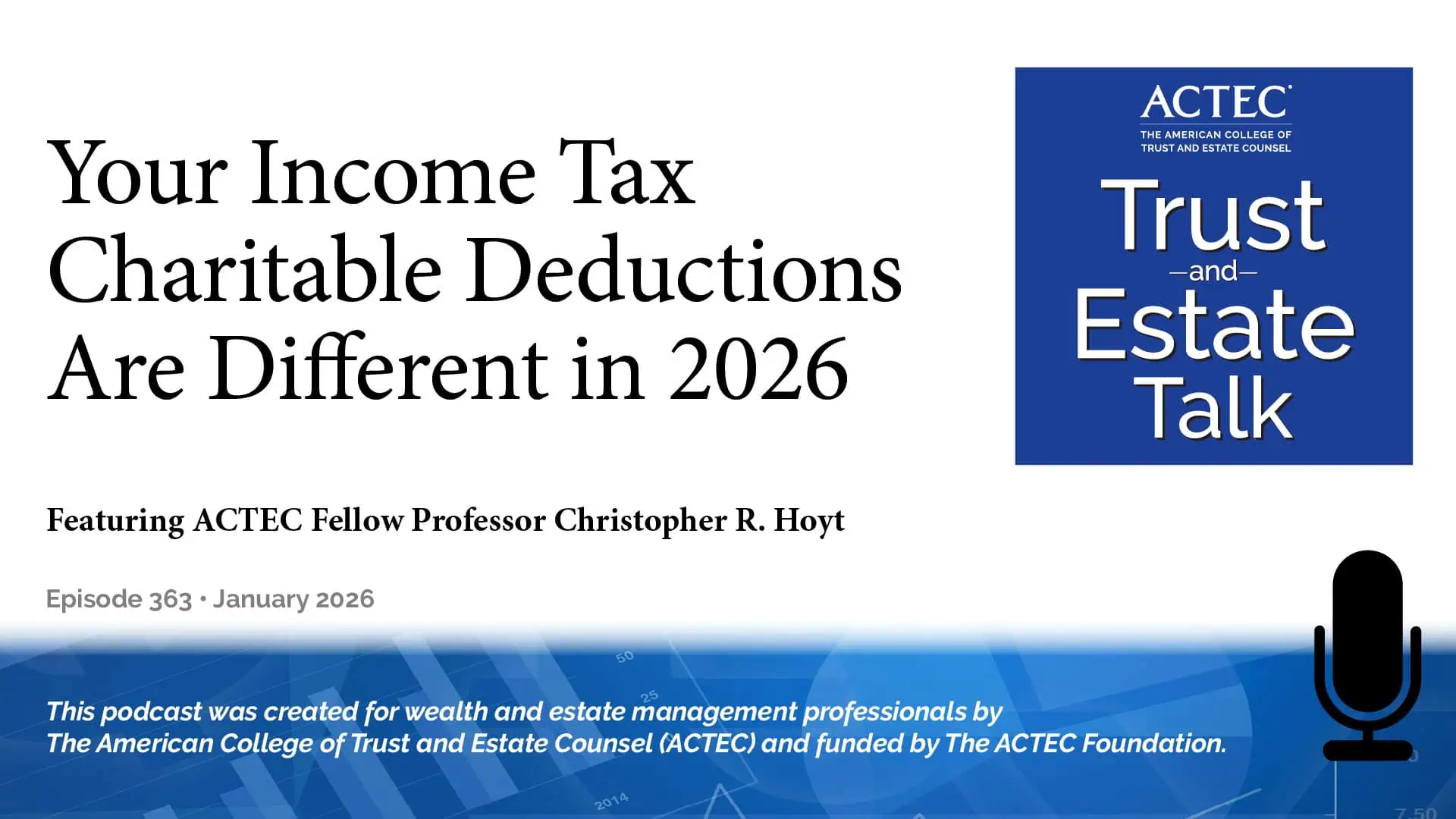Tips for Preparing a Federal Estate Tax Return
“Tips for Preparing a Federal Estate Tax Return,” that’s the subject of today’s ACTEC Trust and Estate Talk.
Transcript/Show Notes
This is Susan Snyder, ACTEC Fellow from Chicago. While planning techniques may come and go, the federal estate tax return will be part of the estate planner’s practice for years to come. When preparing a 706, however, little mistakes can often end up leading to much bigger inquiries. ACTEC Fellow George Karibjanian of Boca Raton, Florida, will review some little-known but important 706 preparation pointers to help you properly prepare basic and more advanced portions of the return for your clients. Welcome, George.
George Karibjanian: Thank you, Susan. This is an abbreviated portion of a larger talk that I give. Usually, it’s called “The Baker’s Dozen, 13 Things You Might Not Know About the 706.” I like to think that I knew the 706 pretty well, and then I started doing this talk and I really zeroed in on 13 things. Maybe most people are aware. I wasn’t aware, and I thought I would share these. So, I’ll outline them, but I’m going to discuss a couple of them in a little bigger detail.
The 706 and Adjusted Taxable Gifts
The first thing I’d like to begin is that adjusted taxable gifts, when you’re filling out the 706, doesn’t mean what you think it means. And usually, I quote the Princess Bride here because most people, when they do adjust it, fill them in just the taxable gifts, are just going to go to the gift tax returns and take the number of prior taxable gifts. That’s not the way you do it. That is not in the definition. In the definition in Section 2010, it doesn’t say take from the gift tax return. And two examples of this would be if the decedent, inadvertently forgot a gift in a closed year, maybe made a $15,000 gift in a year where they made $300,000 of gifts. He just forgot. No fraud, no negligence.
That technically goes on the schedule for adjusted taxable gifts, because it’s any taxable gift that the decedent would have made. The second reason why it’s a fallacy to do just straight from the gift tax return is that when you look at the definition of adjusted taxable gifts, 2010 will back out the value of any gift that’s made that is already included in the gross estate, think your QPRT (Qualified Personal Residence Trust); think you’re GRAT (Grantor Retained Annuity Trust), if you had a substantive remainder. So, be very careful. There’s a worksheet on the 706, worksheet – TG (Taxable Gifts Reconciliation), cue taxable gifts = TG. Learn how to fill that out and you’ll never go wrong.
Alternate Value of Joint Property and IRAs
Number two was alternate value of joint property and IRAs. Now, I used to think for years because title passes immediately upon death with joint property with right of survivorship, or the IRA beneficiary has the right to withdraw as of the moment of death, that that in fact was the alternate value. That’s a distribution. Actually, that’s not what the regs say. The regs will tell you it’s not when it passes upon death, but it’s when the recipient disposes of the property. And maybe that makes sense, but I usually give two examples of how that may not make sense.
What if joint property passes to a third spouse who’s 10 years younger than the oldest child from the first marriage, who’s the personal representative of the estate. Is there going to be cooperation there? I kind of don’t think so. The other example is what if there is a child or a family member who doesn’t speak with anyone else? They may get a share of the IRA. Now, they’re going to have to communicate all transactions that occurred over the last six months. Unlikely, that’s going to occur. So that’s something you must be aware, and you must plan for that.
Estate Tax Return and a Binding Contract to Sell Real Property
A couple of other things, easy one. People ask this question all the time: the decedent died with a binding contract to sell real property. Where do you report that? Well, you might think it goes on A, but actually: it’s a contract for sale. It’s binding. There’s recourse. It goes on C. It’s no longer the decedent’s asset.
Conversely, if the decedent ha contracted to buy property and you’re past the cancellation date, that goes on A. Does it matter? It’s still going on the return. So what? The bottom line is the same. Well, I take the position it does matter because it proves you’ve read the instructions. And if you’re in an audit-type situation, the auditor is going to think, well, they know what they’re doing. Maybe I’ll give them the benefit of the doubt.
Estate Tax Return and a Binding Contract to Sell Real Property
Another issue. Young lawyers always have this question. Mortgages, property’s mortgage. Do I offset it on A, or do I put the full value of the property on A and then put the mortgage on K? Well, the easy way to figure that out is, is the mortgage recourse or non-recourse?
Recourse meaning the bank or lender can come after other assets if the equity in the property isn’t large enough to satisfy the mortgage. If it’s recourse, it is a debt of the estate, not just of the property. So therefore, full value on A and full debt on K.
If it’s non-recourse- and you saw this a lot in 2008 with short sales after the real estate crash- if all they can do is go after the property, then you net it out. And again, does it really matter? No, technically you’re going to do the same number, but one place where it’s very fascinating. Most states do not have a separate statute telling you how to value property. They’re going to rely simply on what does the federal do. And now, what in your probate matter would rely on valuation? Oh, yeah, commissions and fees. This plays a role in that. Promissory notes. The regs say, hey, it’s the unpaid principal plus accrued interest. Well, maybe not. You should always think about going to the people for whom you use valuations for your businesses. Think about getting your notes valued. You can get a discount of maybe 10 to 15 percent. Especially now if you’ve got someone who passed away and has a very low-interest rate loan with rates now above 5 percent. That rate is going to be depressed in value, so you want to get those things appraised.
Deathbed Checks and the Federal Estate Tax Return
Deathbed checks, another fun area. It’s the first-year law school, the mailbox rule! That applies here in tax, but let’s take it one step further. If it’s a check payable to a charity, the minute it leaves the decedent’s hands, it’s out of the estate. If it’s made payable to an individual, that’s not out of the estate until the check clears. If it hasn’t cleared by the date of death, then you have to re-include it in the gross estate; it’s back in the checking account.
I pose this question in greater detail in my talk. What if they it’s gifts to grandkids and they just decide to let it go? The executives were person representatives. Is that a gift from the remainder? Have they not made a taxable gift? Because that’s money that should have gone into the residue but it doesn’t, it goes to the beneficiary. What if the remaindermen are trusts? How can you have a gift from a trust or a charity? So, is there an obligation on the executor now to go after and recover that money? I don’t know of any state statutes that talk about that, but I always pose that question.
How to Report a Refund from a Joint Return
Refund from a joint return. Many people are not aware that there’s a regulation that tells you how to calculate a refund from a joint return and it’s a pretty easy calculation. You’re going to have the decedent’s assets, spouse’s assets, and joint assets. You do two pro formas. You do one for the decedent, just of the decedent’s income and half the joint income. One for the surviving spouse, the spouse’s assets plus half the joint, and now you have your ratio. And that’s how you calculate the refund on a joint return.
But then I pose the question, what if you’re in a jurisdiction that recognizes tenancy by the entireties? And what if, like in Florida, you don’t have to designate it as TBE, if it’s between a married couple, it’s automatically TBE? Is there an immediate transfer? There’s a middle district bankruptcy case in Florida that might say, “Yes.” That actually became TBE property and with TBE, 50-50. I would still follow the regulations, but that’s something to keep in the back of your mind.
Marital and Charitable Deductions
Finally, there’s the whole issue of management versus transmission expenses when dealing with a residuary amount, passing for the marital or charitable. What I tell people to do every day– Microsoft Excel should be your best friend. You should always do a funding analysis of the estate, meaning track your will, track your revocable trust from beginning to end. So you see who gets what and make sure you’re allocating expenses that come out of the residue, and most will. If you’re not going to deduct them on the estate tax return, they must offset non-marital property. Otherwise, you could risk a circular calculation, which is beyond comprehension for this podcast. But if you’re familiar with the 706, familiar with how you allocate expenses, that would make sense.
I would have a clause in your documents that says any principal charges not deducted for federal estate tax purposes should be offset against property that does not pass for the marital. And with that, that’s a very brief overview of these issues. You should just consider — keep it in the back of your mind — and your return will look more solid and more presentable with the auditors.
Thank you, George. Those are very helpful tips for preparing a federal estate tax return.
You may also be interested in:
- Deathbed Planning for the Two Weeks Prior to Death (Jan 2024)
- Considerations for the Two Weeks Following Death (Jan 2024)
A video to share with clients:
Latest ACTEC Trust and Estate Talk Podcasts

Useful But Overlooked Trusts: A Planner’s Guide to When and How to Use Them
Explore overlooked trusts—including HEETs, alimony, voting, and blind trusts—and when estate planners should use them to address complex client needs.

How Cultural Awareness Improves Estate Planning Outcomes
How cultural awareness improves estate planning outcomes, with insights on the racial wealth gap and strategies for more effective, inclusive client guidance.

Planning for a Diverse Family: Cultural Competence Within the Model Rules of Professional Conduct
Cultural competence in estate planning and how the ABA Model Rules guide ethical, inclusive client representation.



